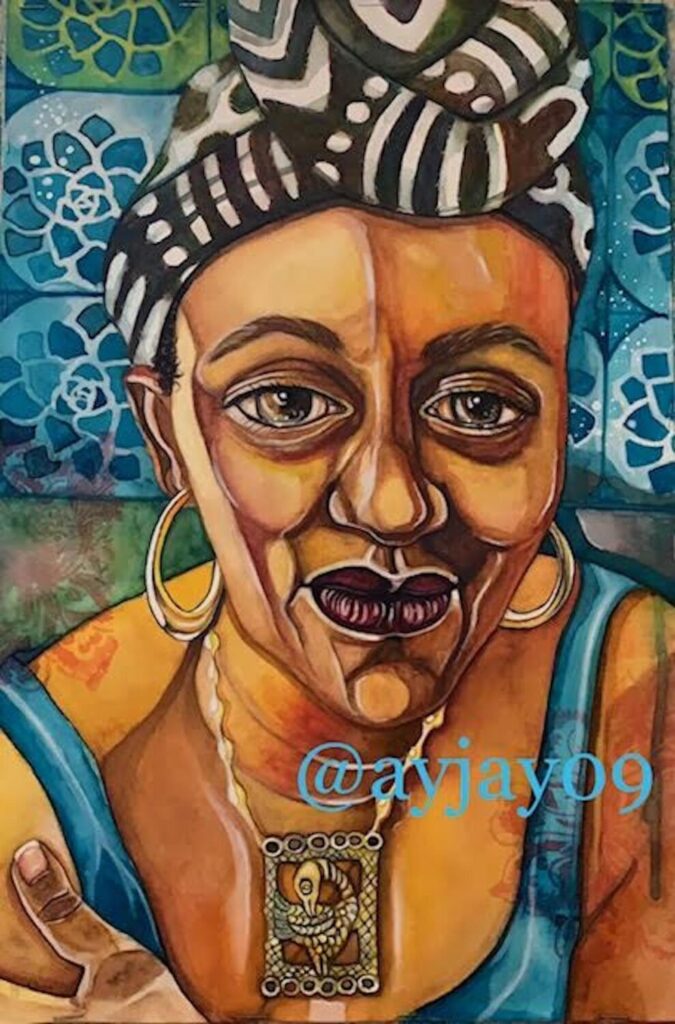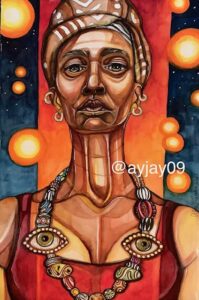Self-taught watercolor artist Alice Traore has lived across the Midwest, including in Milwaukee and Madison, and she found out how crucial art would be in her life. Traore grew up in Peoria, Illinois, and would go on to attend Illinois State University, earning a bachelor of science in English and a master’s degree in Creative Writing. When a position at UW-Milwaukee as a socio-cultural program manager brought her to Wisconsin, Traore found a home in the world of the arts.
“While I was in Milwaukee, I was surrounded by so many creatives, you kind of lose sight of the fact that you, too, are an artist. I spent most of my time being in awe. You could toss a rock and hit an artist, which you don’t want to do. You don’t want to hit artists, but there was so much talent there and still is,” said Traore, recalling meeting both talented local artists such as Derrick Harriell and well-known cultural icons such as Nikki Giovani through her work.
“Being around so many creative types definitely was an encouragement for me to tap back into my creative side.”
Tapping back into art helped change the narrative for Traore. Along with connecting with artists in Milwaukee during her time there, Traore spoke to the art scene in Madison. Mentioning talents like Jerry Jordan, and a Black arts scene that, if not always recognized, continues to shine. This is especially relevant given that arts and culture serve as a primary means of retaining community identity during attempts to replace or contain them.
“It’s easy to dismiss them with some of the struggles that all large cities struggle with,” Traore said. “The bad news overshines all of the pockets of amazing means of survival. The resilience and the re-creation and re-imagining that goes on on the south side, and the north side of these cities. Intentionally keeping their own identity and really pushing back on their spaces being diminished by gentrification and renovation and so forth.”
Struggling to retain identity was an important battle for Traore in her move to Wisconsin. Not wanting to be defined solely by her work or position, the dive into the arts helped provide  a means of return to comfort and expression away from outside pressures and gave her the opportunity to challenge narratives and the further space to explore her own sociocultural journey. It also represented a history Traore was well versed in with a musician as a father and an English major as a mother.
a means of return to comfort and expression away from outside pressures and gave her the opportunity to challenge narratives and the further space to explore her own sociocultural journey. It also represented a history Traore was well versed in with a musician as a father and an English major as a mother.
“I did pursue writing, but the art was always in the background. I was an art minor. It helped to balance those creative pieces of me all through undergrad and grad school,” Traore said, reflecting on how immersing herself in art helped her transition to Madison around 2011.
“If I was reaching for a rung on the ladder, and I kind of stumbled and fell, it was grabbing ahold of my paint brushes and my creativity. That’s what’s been holding me together.”
With art always being an outlet for connection, Traore has also spent her career building bridges and advocating. Traore has worked in both the Division of Diversity, Equity, and Educational Achievement (DDEEA) and the Learning Communities for Institutional Change and Excellence (LCICE) at UW-Madison connecting with students. While

Traore now works in the Center for Teaching, Learning and Mentoring, she recalled how people she met and worked with in DDEEA shaped her future at UW-Madison.
“I want to give another nod and thank you to two amazing individuals that I had the honor of meeting while working at DDEEA, Dr. Hazel Symonette and Dr. Seema Kapani,” said Traore. “These two individuals have given me a foundation for the work that I do in equity, diversity and inclusion. It’s a gift that keeps giving and something I will always treasure. The foundation of their work is that we’ve got to start with the self. And we cannot be afraid to share our stories with each other.”
Sharing is an important first step to what Traore hopes to find through art. Ending on sentiments of escaping from under the pressures of living up to expectations and the effects of racism on Black artistic confidence, Traore concluded that while it is the amazing people she has met in the artistic world that have helped keep her engaged, it is the art itself that is helping her find a way to her end goal of freedom.
“Our systems would crash if everyone was free,” Traore said in closing. “I think through my artwork, some of the images that I’m exploring right now are expressing and asking myself truly what it means to be free. What freedom looks like, and what would I do with my liberation if I were able to achieve it. As best as I can, when an image comes to mind, I might not have the talents and the skills to put to a visual image what I’m seeking, but I’m going to be brave and try to do it regardless.”
To check out some of Alice Traore’s work, visit her Instagram page here.






























